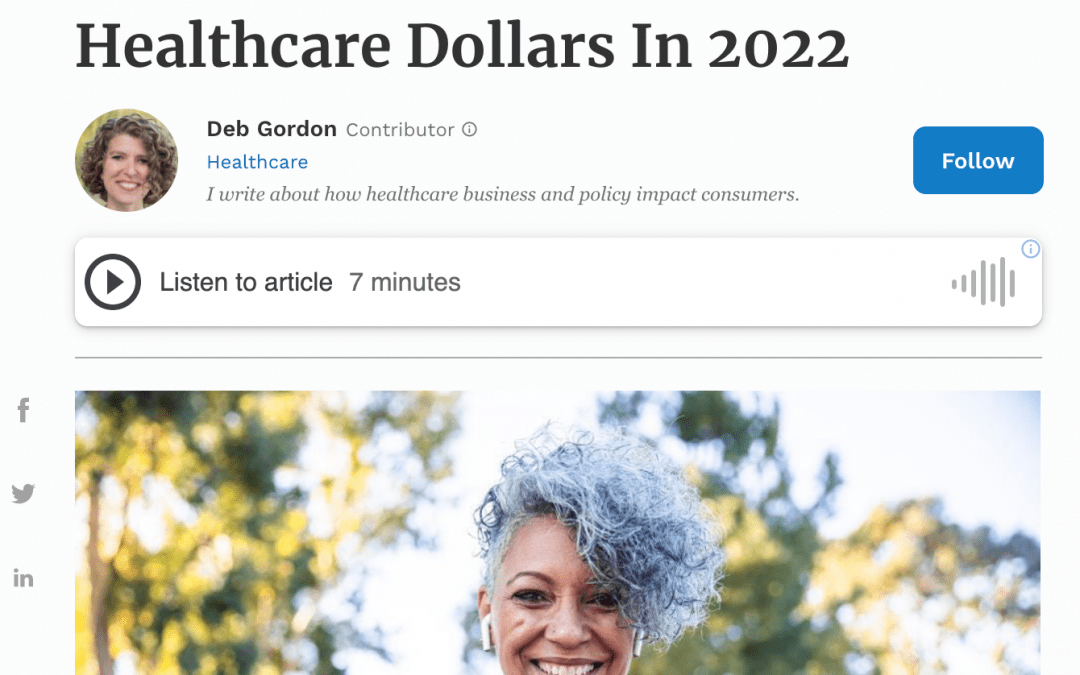
How To Make The Most Of Your Healthcare Dollars In 2022
Deb Gordon 04:15pm EST Healthcare
I write about how healthcare business and policy impact consumers.
If the era of consumerism has finally arrived in American healthcare, as recent surveys suggest, Americans may need to be ready to take charge of their healthcare finances.
But that role may be unfamiliar to many, especially given that most Americans health insurance through an employer or the government.
Enter patient advocates—professionals who help consumers with financial or clinical aspects of healthcare from inside organizations or as stand-alone practitioners.
Sometimes, these advocates can help patients save huge amounts of money.
Ron Shinkman, a certified patient advocate based in Los Angeles, says he recently represented a client with a $67,000 bill for emergency services performed at a U.S. military installation overseas. Though the client has both Medicare and Veterans Affairs benefits, he was billed $52,000. A collection agency then tacked on an extra $15,000 in fees, because, according to Shinkman, “No one was stopping it from doing so.”
Shinkman discovered a minor glitch in the paperwork, contacted military representatives, and involved a major media outlet. The bill was forgiven.
Betty Long, president and CEO of Guardian Nurses Healthcare Advocates, has similar stories.
Long’s firm recently took on a client whose insurance had refused to pay for a procedure to correct an abnormal heartbeat. The hospital had billed for a permanent implant but had actually used a device that isn’t permanent. Only when a nurse reviewed the operative notes did the discrepancy come to light and the insurance company agreed to pay the entire bill.
Long’s tip? “Like Winston Churchill said, ‘Never give up!’ “Keep calling, take names, and keep asking questions.”
Even if you don’t have a patient advocate fighting your healthcare battles for you, here are six expert tips on how to stretch your healthcare dollars.

1. Get to know your health insurance policy
Studying your health insurance materials may be less appealing than reading a notice from the IRS, but experts say it’s essential.
“I’m going to advise everyone to get intimate with their health insurance policy certificate of coverage. And if you don’t know how to read it, get an advocate to help,” said Nicole Broadhurst, board-certified patient advocate and lead medical billing advocate at Tennessee Health Advocates. “The only way to plan for healthcare expenses is to actually know what we are responsible to pay.”
Gail Trauco, a nurse advocate and founder of Medical Bill 911, also urges people to learn about their coverage.
“Read your insurance policy and understand [its] limits, out-of-network and in-network stipulations,” Trauco said. “Insurance has limitations and it is your responsibility to plan.”
When you know your policy, you may find extra benefits to which you’re entitled.
Saira Patel, a New York City-based patient caregiver, recommends using benefits such as transport to and from medical or pharmacy visits and discounts or allowances for over-the-counter medications and vitamins. These benefits are particularly common in Medicare Advantage plans.
2. Read medical bills closely
Shinkman urges consumers to read medical bills closely and with a dose of skepticism.
He followed his own advice after undergoing a surgical procedure in 2019. His bill showed a charge from an anesthesiologist even though a nurse anesthetist had administered his anesthesia. When he asked about it, Shinkman was told the doctor had visited him while he was unconscious. Shinkman filed a grievance with his state’s insurance regulator and the provider agreed to cancel the charge.
“Patients should understand that they won’t find victories like this easy, and the provider will never fully admit wrongdoing, but they will reverse course if you confront them with accurate information and a tone that is polite while also suggesting you will never back down,” Shinkman said. “There isn’t nearly enough of that coming from patients, and it is time for that to change.”
3. Ask for the cash price
Particularly when it comes to prescription drug costs, many Americans are overpaying by using their insurance, according to Mary Shomon, author and thyroid and hormone health activist.
“Always ask the pharmacist which is the lower price: your insurance copay or the cash price without insurance,” Shomon said.
The cash price, she says, is often lower.
4. Go digital
Telemedicine can save you money, according to Dr. Rajinder Chahal, a California-based endocrinologist and cofounder of WhiteCoatRemote.com, a job board for remote healthcare workers.
For example, Chahal says, a video consultation with an at-home sleep test may cost hundreds of dollars and replace an overnight sleep study that costs thousands.
“Not all patients are eligible but for those who are, telemedicine alternatives to in-person treatment for a variety of conditions can be a huge money saver,” Chahal said.
5. If you don’t have insurance, ask for help
Trauco suggests asking about drug company patient assistance programs to get lower-cost prescription medications and tapping into charitable funds, available at most major medical centers, if you’re struggling with bills.
If you don’t have insurance but need care, ask for services “in kind” or try to negotiate up-front payment for a reduced rate, suggests Dr. David Nayak, a board-certified allergy and immunology specialist and founder of Strength to Love Foundation, a free asthma and allergy clinic for patients without insurance.
“If you are lacking medical insurance, do not take ‘No’ or ‘We don’t provide services for the uninsured’ for an answer by those you seek care from,” Nayak said.
Some providers offer free services. Check the National Association of Free and Charitable Clinics for free clinics in your region.
6. It’s your money. Act like it.
When it comes to out-of-pocket healthcare costs—which can run as high as as $5,000 to nearly $20,000 per year—Americans should start practicing “fearless autonomy,” Shinkman says.
“Doctors are mostly incurious about costs, often to a fault,” he said.
Therefore, it will likely fall to you to ask about costs and speak up if something doesn’t look right.
More from Deb Gordon:
Follow me on Twitter. Check out my website or some of my other work here.

